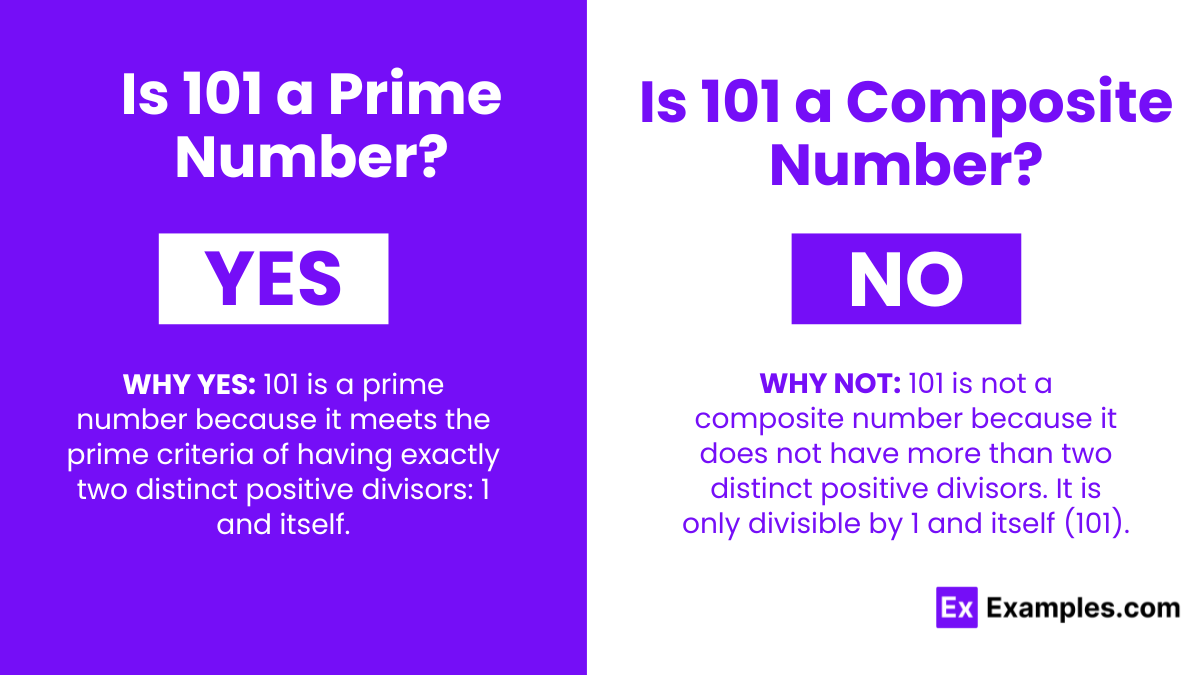Is 101 a prime number?
Yes
No
Only if it is odd
Only if it is divisible by 3

Why Yes: 101 is a prime number because it meets the prime criteria of having exactly two distinct positive divisors: 1 and itself. Check Prime or Not
Why No: 101 is not a composite number because it does not have more than two distinct positive divisors. It is only divisible by 1 and itself (101).
| Property | Answer |
|---|---|
| Is 101 a prime number? | Yes |
| Is 101 a composite number? | No |
| Is 101 a perfect square? | No |
| Factors of 101 | 1, 101 |
| Multiples of 101 | 101, 202, 303, 404, 505, 606, 707, 808, 909, 1010 |
| Cube Root of 101 | 4.657 |
| Square of 101 | 10201 |
| Square Root of 101 | 10.05 |
| Is 101 a Perfect Cube? | No |
| Is 101 an Irrational number | No |
| Is 101 a Rational number | Yes |
| Is 101 a Real number | Yes |
| Is 101 an Integer | Yes |
| Is 101 a Natural number | Yes |
| Is 101 a Whole number | Yes |
| Is 101 an Even or odd number | Yes (101 is an odd number) |
| Is 101 an Ordinal number | Yes |
| Is 101 a Complex number | Yes (as all real numbers are also complex numbers) |
The factors of 101 are 1 and 101. 101 is a prime number because it is only divisible by 1 and itself, demonstrating it has exactly two factors. This clarity confirms that it is a prime number, not a composite number.
101 is categorized as a prime number because it has exactly two distinct positive divisors: 1 and itself.
The nearest prime numbers to 101 are 97 and 103. 97 is the closest prime number less than 101, and 103 is the closest prime number greater than 101.
Text prompt
Add Tone
10 Examples of Public speaking
20 Examples of Gas lighting
Is 101 a prime number?
Yes
No
Only if it is odd
Only if it is divisible by 3
How can you check if 101 is a prime number?
Divide it by 2
Check if it is divisible by any number other than 1 and itself
Divide it by 10
Check if it is divisible by 5
What is the smallest prime number less than 101?
2
3
97
89
Which of the following numbers is not a prime number?
101
103
104
107
Is 101 divisible by any prime number smaller than itself?
Yes, 2
Yes, 3
Yes, 5
No
What is the result of dividing 101 by 7?
14
13
15
16
What is the next prime number after 101?
103
104
107
109
Which property is true about 101?
It is an even number
It is a prime number
It is a composite number
It is a perfect square
Is 101 greater than the product of 5 and 20?
Yes
No
Only if multiplied by 2
Only if it is squared
Which statement is correct about the number 101?
It is divisible by 11
It is divisible by 13
It is divisible by 17
It is not divisible by any number other than 1 and itself
Before you leave, take our quick quiz to enhance your learning!

